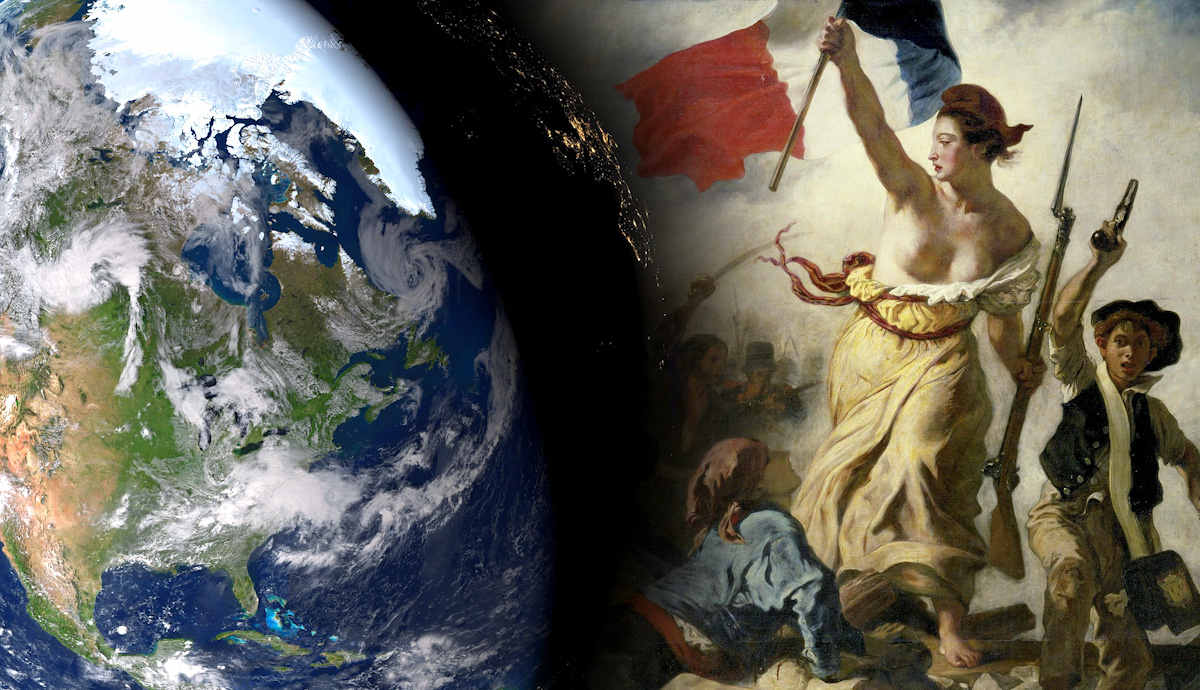
What is globalization? What is nationalism? How can we understand the theory of politics in light of this dichotomy? This article begins with an attempt to clarify the relationship between globalization (as a process) with nationalism (as a theoretical position). It then moves on to discuss the relationship between globalization and nationalism in democratic politics. The questions of rhetoric and whether there are material disagreements to correspond to the strictly discursive confrontation are addressed. The relationship between this dichotomy and the field of political aesthetics is then considered, before an attempt is made to distinguish various defenses of globalization and nationalism from one another, however partially.
Characterizing The Debate Between Defenders of Globalization and Nationalism

How best can we characterize the dichotomy between globalization and nationalism? It is worth beginning with an attempted clarification of some confused terminology. Whereas globalization is a process, albeit one of which the terms are severely disputed. The term which might be best for designating those who roughly hold globalization to be a “good thing” is globalism. Yet globalism has acquired such specific, negative connotations in recent times that the term feels odd, although it will crop up periodically in this article.
The philosophical discussion of globalization and nationalism is a new one. Indeed, this way of characterizing developments in economics, politics, and culture is itself quite new. One of the first questions to address is how we should define these two opposing ideologies. A balanced definition will be as free as possible from pejoratives, from misrepresentation, allows a conversation to take place, and thereby justifies our use of these two, opposing terms as the frame for productive discourse about contemporary political problems.
Let’s start with a provisional definition. globalization stands for a defense of the increased fluidity of goods, wealth, people, and culture across borders. The perspective of globalization is one in which we are arbitrarily restricted by national boundaries (and indeed other exclusionary forms of identification) in such a way that our lives are more difficult, and many opportunities for collaboration on shared problems are thereby lost.
The nationalist perspective, in contrast, holds that national boundaries are not wholly arbitrary, and indeed whatever the status of their origins, there is value in preserving them.
The Democratic Context

To go further, it is necessary to separate off certain subjects and consider if and how far discourse within them can be developed with reference to the confrontation of globalization and nationalism.
Let us start with politics, and specifically democratic, electoral politics. It is important to account for the irrationality of democracy as we attempt to analyze it. There is, after all, no reason to think that the way a democratic political campaign pans out has much to do with material states of affairs and not an accumulation of accidents of persuasion.
Framing the latter in terms of a confrontation between globalization and nationalism is often extremely helpful. Indeed, globalization and nationalism can be understood in this context as two opposing political aesthetics.
Globalization might, for instance, express a certain kind of confidence towards new, as yet unrealized forms of politics, the possibility of politics surpassing its current theatre of national governance. On the other hand, nationalism might make appeals to conserving what we presently have, to the instability of the world beyond the known, national border. These are common ways in which stances with respect to globalization correspond to broader political perspectives. However, it is the very slipperiness of these terms with respect to the political “big picture” (that is, with respect to ideologies as such) that makes an analysis of globalization and nationalism so difficult and so interesting.
Rhetorical Devices?

The aforementioned way of conceiving of the difference between globalization and nationalism (globalization as expressing optimism about new ways of doing politics, nationalism as conserving existing structures of political stability) might appear to constitute them as, in some sense, rhetorical devices rather than rational concepts by which political action can be structured (outside of whatever attempts are being made to alter public perception).
Certainly, both nationalism and globalization are powerful rhetorical tools. There is a totemic significance to referring to someone as a “nationalist” or “globalist,” independently of any particular policy that might be associated with these terms.
The discursive force is, if anything, heightened by the very formlessness of the political aesthetic associated with these terms. Take the binary we discussed above, for instance, in which nationalism stands for stability and globalization for unrealized possibilities. We can imagine, of course, a conservative globalization that emphasizes the pre-existing relationships between economies and cultures. On the other hand, nationalism can also be conceived as radical and seeking to remodel societies, a nationalism that thrives on—rather than oppose—instability.
Political Aesthetics

Here is where attempting to demarcate the relationship between nationalism and globalization turns into a problem of political aesthetics. What is political aesthetics? What is the relationship between the political and aesthetics?
Roughly, we can conceive of political aesthetics as the study of politics, its systems, and processes in terms of its aesthetic elements. The very idea of “political theater,” or of the political “text” (be it a work of political theory, a constitutional document, or a policy statement) implies an aesthetic dimension to politics. Understanding the aesthetic dimension of politics means understanding where in politics it is the aesthetic component that is doing the most work.
Given the lack of any strict definition of the globalization-nationalism dichotomy in terms of practical political change, we might turn to the realm of aesthetics to explain the appeal of these categories. The range of aesthetic qualities which can be ascribed to something and, even more broadly, the aesthetic judgments which can be made of it, are extremely broad. There is a cluster of aesthetic qualities which appear to group themselves around the categories of globalization and nationalism in a given political environment and manifest in forms of political expression as an undercurrent.
The Point of Political Aesthetics

Yet that isn’t to say that globalization and nationalism represent their own, respective, mobile army of aesthetic signifiers. There is a sense in which the dichotomy between globalization and nationalism constitutes a dispute over the value of political aesthetics itself.
Nationalisms, in general, tend to place more emphasis on the symbolic elements of politics. Nazi Germany is almost inevitably the first case study for any attempt to relate aesthetics to politics. Nationalism’s attachment to its aesthetic goes beyond a kind of instrumentalization of aesthetic features, but an independent attachment. The idea of doing things for symbolic purposes, the idea that the independence of the nation-state is a symbolic act, is peculiar to nationalism.
Indeed, the dichotomy between globalization and nationalism can be conceived of as an extension of the problem of constructing politics itself. Certain theories of politics hammer this point home more explicitly than others. Carl Schmitt, for instance, held that politics begins just as the point where we can draw distinctions between our friends and our enemies, and the debate over globalization and nationalism is nothing if not an attempt to draw that very distinction.
Forms of Nationalism and Globalism

Although this article has so far attempted to draw out the differences between nationalism and globalization, it is important to stress that modern confrontations between these two ways of thinking are partly defined by their very fluidity.
Liberal forms of nationalism tend to emphasize the pragmatic value of thinking of politics in terms of the nation-state, rather than any deep ethnic or otherwise intrinsic “right.” Similarly, insofar as globalism is often posited as a pragmatic political position, it is also best understood as receptive to nationalism within certain, clearly prescribed limits. After all, globalization is a process that, at least on a globalist account of things, cannot be stopped (or at least, cannot be stopped without other severe trade-offs). Given that, the persistence of certain forms of national organization isn’t problematic per se for those who favor globalization, even if these are largely expected to ebb away in the long term.
Here we can draw the distinction between forms of nationalism/globalism that are more or less “pragmatic” positions, and those which express some other, more absolute commitment. We can also attempt to distinguish nationalisms and globalisms that understand their respective ideology to be an observation of historical inevitability, against those who take their ideology to be a stance against, in spite of, regardless of history.










